Source
Vitamins and minerals are essential for your overall health. They support important functions such as immune response, energy production, and bone health. For instance, vitamin C enhances collagen formation and helps fight infections, while calcium strengthens your bones. Deficiencies in these nutrients can lead to severe health problems like anemia or osteoporosis. Foods like fruits, vegetables, lean meats, and dairy are excellent sources of these essential nutrients. While supplements can fill gaps, they shouldn’t replace a balanced diet. Ensuring you get enough vitamins and minerals safeguards your well-being and helps prevent diseases. There’s more to explore about maintaining a healthy diet.
Key Takeaways
- Vitamins and minerals are vital for the body’s various functions, including immune support, energy production, and disease prevention.
- Essential vitamins like A, D, E, K, and C, and minerals like calcium and iron are crucial for maintaining overall health.
- Deficiencies in vitamins and minerals can lead to serious health issues like night blindness, osteoporosis, anemia, and scurvy.
- Nutrient-rich foods such as fruits, vegetables, lean meats, and dairy ensure adequate intake of essential vitamins and minerals.
- A balanced diet provides the necessary antioxidants to combat free radicals and support cellular health.
Understanding Vitamins and Minerals
Vitamins and minerals, essential micronutrients, are crucial for your body’s various functions and overall health. Imagine them as tiny superheroes working behind the scenes to keep everything running smoothly.
You’ve got 13 essential vitamins, from the water-soluble B-complex and C to the fat-soluble A, D, E, and K. Major minerals like calcium and potassium are your body’s heavy lifters, while trace minerals such as iron and zinc handle the delicate tasks.
A lack of these nutrients can turn your body into a malfunctioning robot. Seriously, deficiencies can lead to major health issues. So, maintaining a balanced diet is like giving your body a VIP pass to excellent health.
Trust me, you don’t want your body to miss this party!
Key Functions of Micronutrients
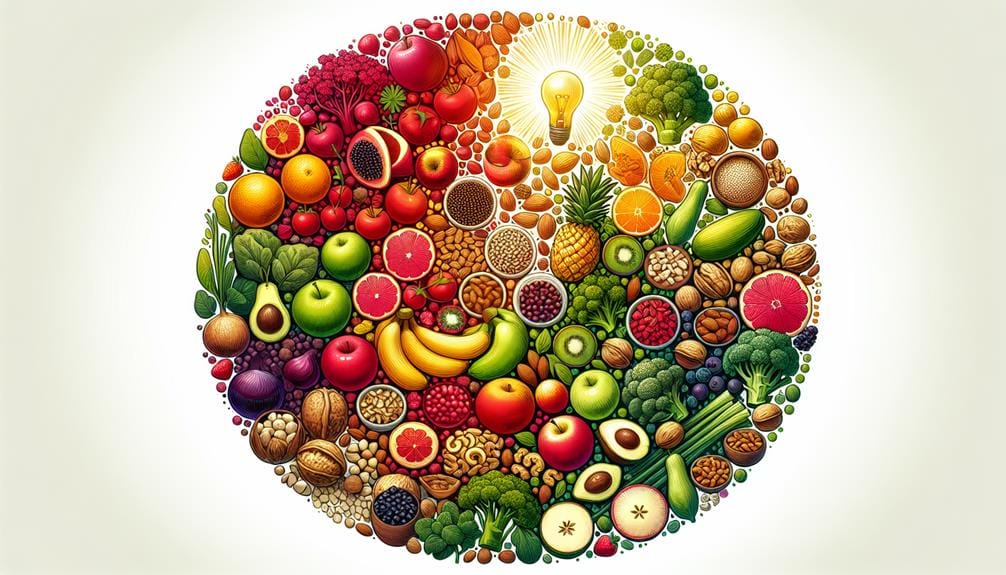
When you consider the key functions of micronutrients, you’ll see they play an important role in supporting your immune system and boosting energy production.
Vitamins and minerals like vitamin C and iron are essential for maintaining a strong immune response, while B vitamins help convert the food you eat into energy.
Ensuring a balanced intake of these nutrients can greatly impact your overall health and well-being.
Immune System Support
Micronutrients like vitamin C, vitamin D, and zinc are essential for bolstering your immune system and fighting off infections.
Think of vitamin C as your immune system’s personal trainer, pumping it up with collagen formation and infection-fighting skills.
Vitamin D, on the other hand, is like the calm yoga instructor, regulating your immune responses and reducing inflammation.
And zinc? Well, zinc’s the bouncer at the club, ensuring only the best immune cells get in and do their job.
Together, these vitamins and minerals form the dream team for keeping you healthy and infection-free.
Energy Production Boost
Maximizing your body’s full energy potential starts with ensuring you get enough B vitamins and vitamin C. These essential micronutrients are like the backbone of a rock concert—without them, the show can’t go on [4].
B vitamins are crucial players in your metabolism, helping convert carbs, fats, and proteins into the energy you need to conquer your day. Vitamin C, on the other hand, is your iron absorption assistant, ensuring you receive the oxygen boost necessary for peak vitality.
Sources of Essential Nutrients
From a variety of food sources, you can obtain essential nutrients like vitamins and minerals to support your overall health. Foods like green leafy vegetables, fortified breakfast cereals, dairy foods, and lean meats are packed with these important nutrients. For example, vitamin C, your immune system’s best friend, can be found in raw fruits like oranges and strawberries. Calcium, the bone whisperer, is abundant in dairy products and leafy greens. Iron, important for oxygen transport, can be found in red meat and fortified cereals. Here’s a quick cheat sheet:
| Nutrient | Source | Example |
|---|---|---|
| Vitamin A | Leafy green vegetables | Spinach, kale |
| Vitamin C | Raw fruits, vegetables | Oranges, cabbage |
| Calcium | Dairy foods, leafy greens | Milk, broccoli |
| Iron | Lean meats, fortified cereals | Beef, breakfast cereals |
Benefits of a Balanced Diet
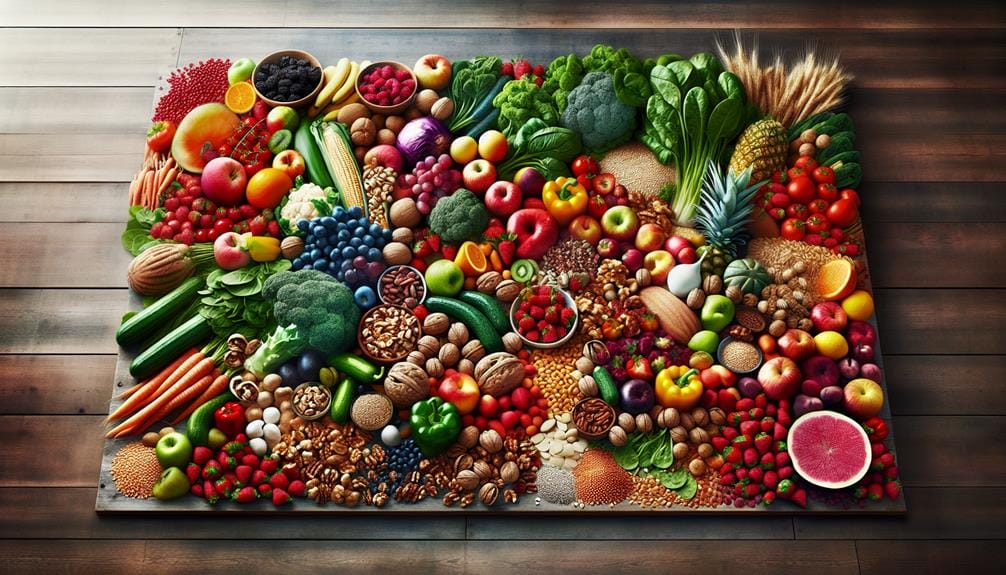
Consuming a balanced diet provides numerous benefits, including a stronger immune system and better disease prevention.
By selecting nutrient-rich foods like fruits, vegetables, and lean proteins, you’ll guarantee your body receives the essential vitamins and minerals it needs.
These nutrients support various bodily functions, aiding you in maintaining overall health and wellness.
Nutrient-Rich Food Choices
Incorporating a variety of nutrient-rich foods into your meals guarantees you get essential vitamins and minerals for peak health. Think of your plate as a colorful masterpiece—fruits, veggies, whole grains, lean proteins, and dairy.
These food choices aren’t just a feast for the eyes but a buffet of essential nutrients. Imagine vitamin A waving hello from your carrots while vitamin C flexes in your oranges. Lean proteins, like fish and poultry, sneak in iron and B vitamins, keeping you energized.
Whole grains? They’re the party planners, ensuring magnesium and selenium boost your heart health. A balanced diet isn’t just good for you—it’s like having a nutritional rock band, each member playing their part for your health’s greatest hits!
Immune System Boost
When you maintain a balanced diet rich in essential vitamins and minerals, your immune system gets the boost it needs to fend off infections and illnesses.
Picture your immune system as a superhero squad, and essential nutrients like vitamin C, zinc, and vitamin D are the sidekicks that keep it fighting fit.
By consuming a variety of nutrient-dense foods, you guarantee those sidekicks are at peak levels, ready to maintain a strong defense.
Vitamin C boosts your immune system, zinc helps with cell function, and vitamin D keeps everything in check.
Disease Prevention Strategies
A balanced diet rich in vitamins and minerals helps prevent diseases like scurvy, night blindness, and osteoporosis . You’ll be the picture of health, not a pirate with scurvy! Nutrient-dense foods are your best friends. They’re packed with everything you need for disease prevention, muscle function, and bone health.
Antioxidants like vitamins C and E are like bodyguards for your cells, protecting against damage. Minerals such as calcium and magnesium are essential for strong bones and muscles. While supplements can help, they’re not a substitute for a balanced diet.
Don’t wait for deficiency prevention to become a full-time job; eat a variety of foods to keep everything running smoothly. Your future self will thank you!
Risks of Nutrient Deficiency
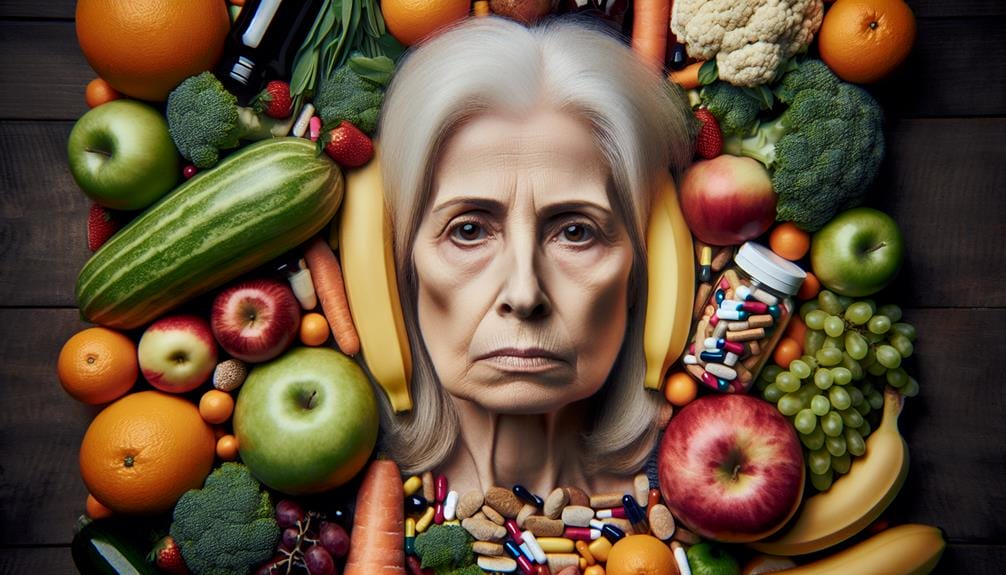
Nutrient deficiencies can wreak havoc on your health, leading to conditions like night blindness, scurvy, and osteoporosis.
Think of vitamin A deficiency as being caught in a never-ending horror movie: your night vision goes kaput, and infections line up like enthusiastic extras.
Vitamin C deficiency isn’t any better—scurvy will leave you feeling like a pirate with bleeding gums and swollen joints.
And don’t forget vitamin D deficiency, which can make your bones as brittle as grandma’s china, inviting osteoporosis.
Even the rare vitamin E deficiency can crash your immune party and ruin your skin.
Finally, a vitamin K deficiency might turn a paper cut into a scene from a slasher flick.
Keep your nutrient game strong to dodge these health risks!
The Role of Vitamin A
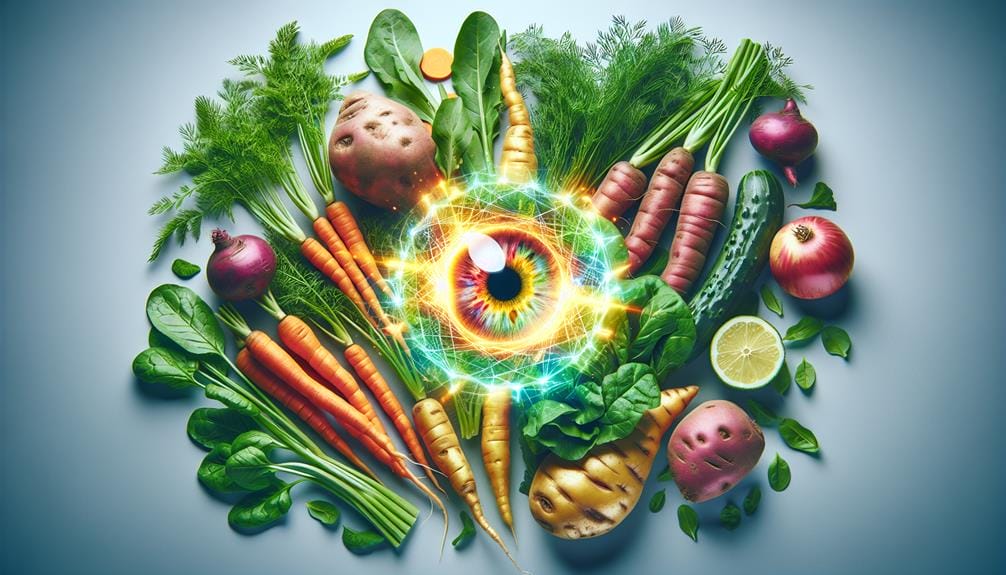
Vitamin A plays an essential role in maintaining your immune system, vision, and skin health. Think of it as the superhero of nutrients, swooping in to save your eye health and keep your skin glowing.
You can find Vitamin A in food sources like orange/yellow fruits, leafy greens, liver, eggs, and fortified milk products.
Don’t risk a deficiency, or you might find yourself battling night blindness or even worse, irreversible blindness. Plus, without enough Vitamin A, your immune system could falter, leaving you more susceptible to infections.
And let’s not forget about your skin – excessive keratin build-up is nobody’s friend. So, keep munching those carrots and kale to stay in top shape!
Importance of Vitamin D
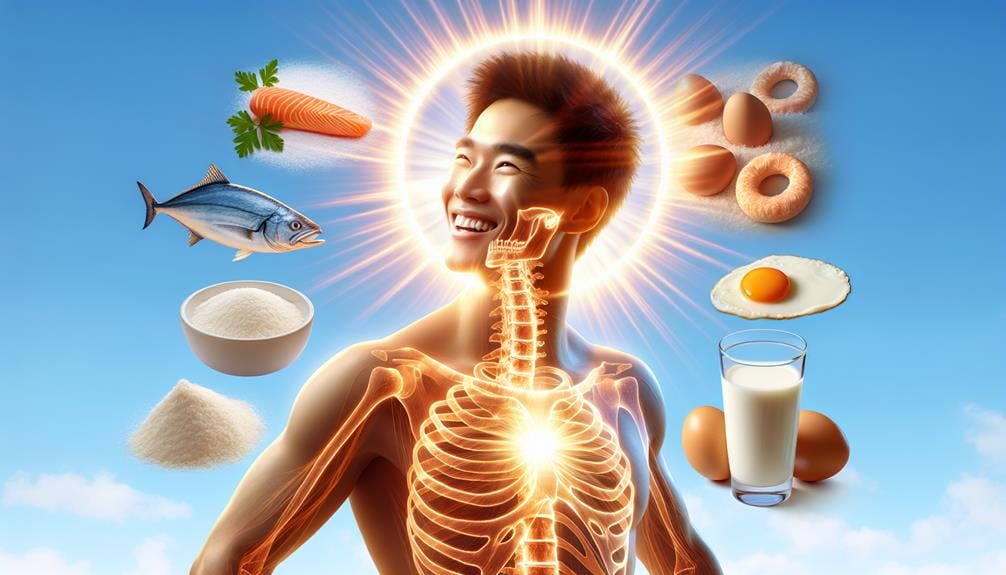
While Vitamin A keeps your vision sharp, Vitamin D steps in to guarantee your bones and teeth stay strong. It’s like your body’s very own construction crew, making sure calcium and phosphorus get absorbed properly.
Beyond the bony benefits, Vitamin D also moonlights as an immune system superhero, reducing inflammation and keeping you healthy. Don’t get caught with a deficiency, or you might end up with rickets—a condition that’s definitely not as enjoyable as it sounds.
Just a bit of sunlight, some fortified milk, or fatty fish can keep you in the clear. So, next time you’re soaking up the sun, know you’re also soaking up some essential Vitamin D goodness!
Iron and Energy Levels
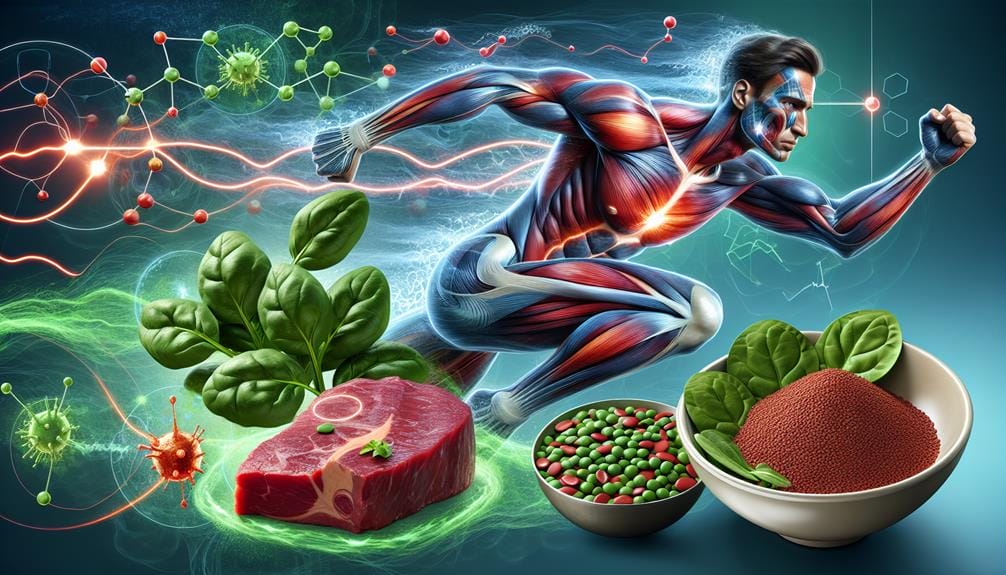
Iron plays a crucial role in keeping your energy levels up by aiding in the production of hemoglobin, which transports oxygen to your cells and tissues. Without enough iron, you might feel like a deflated balloon – tired, weak, and just not your sharpest self. That’s because iron deficiency can lead to anemia, making it hard for your body to get the oxygen it needs. To avoid this, munch on iron-rich sources like red meat, lentils, and fortified cereals. And don’t forget, pairing these with vitamin C-rich foods can boost absorption.
| Iron Source | Benefits | Boost Absorption With |
|---|---|---|
| Red Meat | High Iron Content | Bell Peppers |
| Lentils | Vegetarian Friendly | Citrus Fruits |
| Fortified Cereals | Convenient Breakfast | Strawberries |
Keep your energy levels high, and don’t let iron deficiency get you down!
Calcium for Bone Health
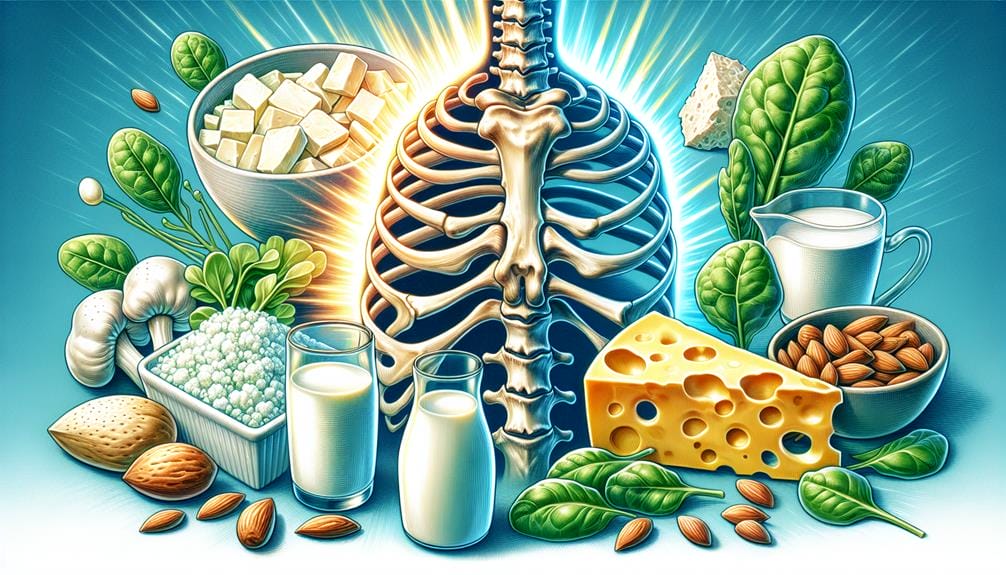
Calcium is essential for maintaining strong bones and teeth, and you need to include enough of it in your diet to support bone density.
Aim for 1,000-1,200 mg daily if you’re over 51, with rich sources like milk, dairy products, tofu, and dark-green leafy vegetables.
Adequate intake helps prevent bone-related conditions like osteoporosis, ensuring your skeletal system stays robust.
Bone Density Maintenance
Maintaining bone density requires a diet rich in calcium from sources like milk, leafy greens, and sardines. Without enough calcium intake, you might end up with bones as brittle as your grandma’s fine china.
To support bone health, adults over 51 should aim for a recommended intake of 1,000-1,200 mg/day of calcium (that’s about four cups of milk, for those keeping track) and 15-20 mcg/day of vitamin D. Vitamin D is like calcium’s sidekick, helping your body absorb it effectively.
Think of them as the dynamic duo, preserving your bone density and keeping osteoporosis at bay. Don’t skip out on these nutrients if you want to keep your skeleton sturdy and ready for action!
Calcium-Rich Foods
You can boost your bone health by incorporating calcium-rich foods like dairy products, tofu, and dark-green leafy vegetables into your daily diet. Want to avoid the old-age shuffle? Load up on dairy and leafy greens because they’re the superheroes of bone density.
Older adults, listen up: calcium and vitamin D sources are your best pals in the fight against osteoporosis. Sardines and salmon aren’t just for cats—they’re packed with calcium and vitamin D. Seize the day, and your bones will thank you.
Whether you’re munching on fortified cereals or sipping fortified milk, your bone health will benefit. So, embrace calcium-rich foods and keep those bones ready to dance well into your golden years!
Daily Intake Recommendations
To keep your bones strong and healthy, it’s important to know your daily calcium intake recommendations. For older adults, calcium is a superstar in the vitamins and minerals category, helping to fend off osteoporosis. Men aged 51+ need 1,000-1,200 mg of calcium daily, while women should aim for 1,200 mg. Don’t forget vitamin D, which teams up with calcium for peak bone health. You can find calcium in various sources like milk, tofu, and even sardines. Here’s a handy table for your daily intake:
| Age Group | Calcium (mg/day) | Key Sources |
|---|---|---|
| Men 51+ | 1,000-1,200 | Milk, sardines |
| Women 51+ | 1,200 | Tofu, leafy greens |
| All | – | Fortified cereals |
Antioxidants and Free Radicals
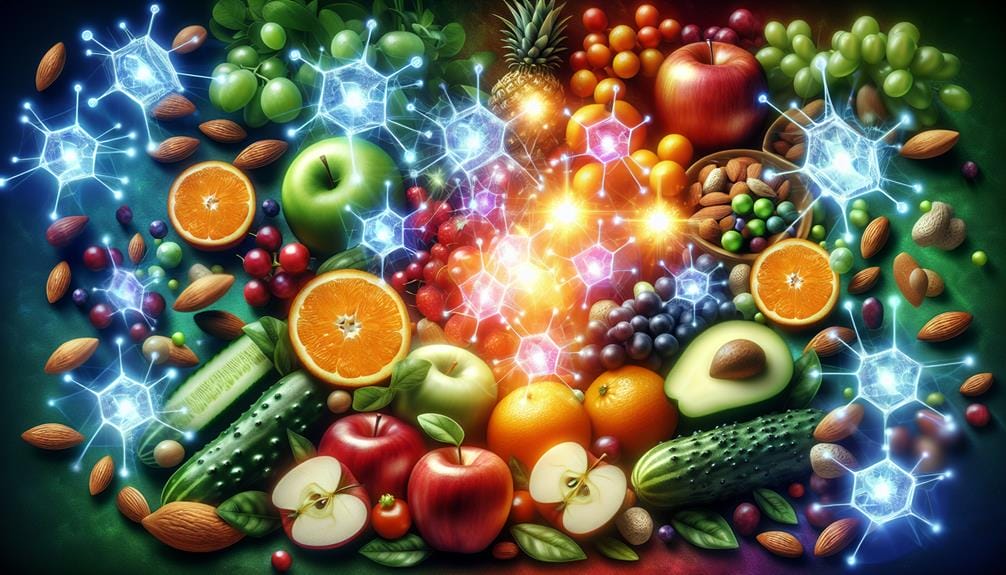
Although free radicals can wreak havoc on your cells and DNA, antioxidants like vitamins C and E, along with minerals such as selenium, are powerful allies in combating this damage.
Think of free radicals as tiny, chaotic gremlins causing oxidative stress and cellular damage, while antioxidants are like your body’s superhero squad, swooping in to save the day.
Carotenoids and flavonoids, found in fruits and veggies, also join this heroic team. By consuming a variety of antioxidant-rich foods, you can help neutralize these pesky free radicals, promoting overall health and well-being.
Should You Take Supplements?
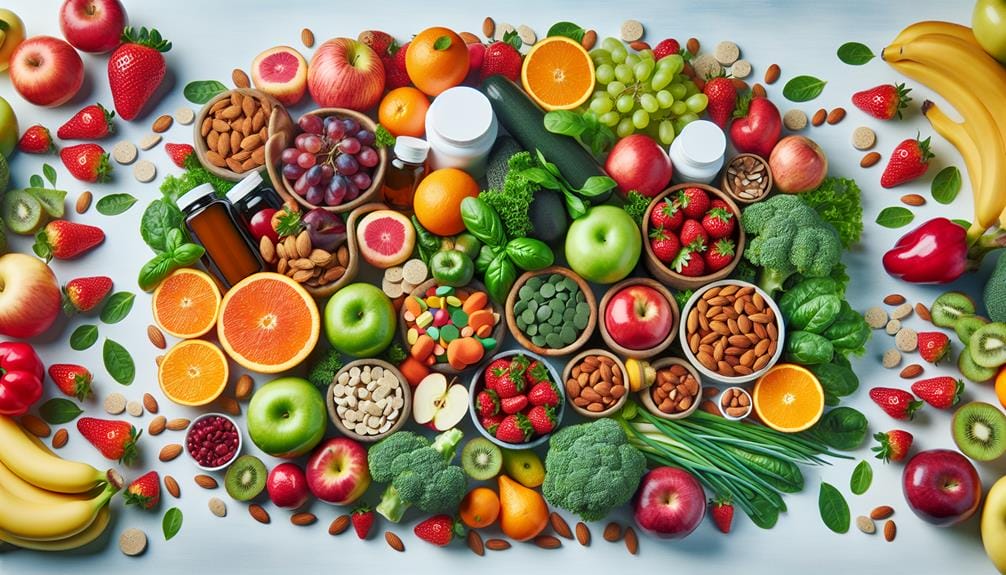
Before reaching for a bottle of supplements, consider whether your diet already meets your nutritional needs. If you’re munching on a balanced diet that includes all the food groups, you mightn’t need those shiny pills.
Teenagers, especially, often don’t need extra supplements if their meals are well-rounded. But hey, if you’re skipping meals or following a restrictive diet, it’s a different story. Be wary of claims promising magical results from excessive intake; more isn’t always better and could pose potential health risks.
Always chat with a healthcare professional before diving into the supplement pool. After all, nobody wants to turn their kitchen into a mini-pharmacy without some expert advice!
Consulting Healthcare Professionals

Relying on healthcare professionals guarantees you receive personalized advice on your vitamin and mineral needs based on your unique health factors. Think of them as your nutritional GPS, steering you clear of potential deficiencies and recommending dietary changes.
They make sure you don’t turn your daily vitamin C into a citrus overdose by guiding you on safe intake levels. Plus, these pros provide accurate information and tailored recommendations, ensuring you’re not just popping pills without a plan.
And let’s not forget the magic trick they perform: sorting out interactions with medications to keep you in tip-top shape. So, trust the experts—they’ll help you navigate the vitamin and mineral maze without getting lost.
Conclusion
In essence, understanding vitamins and minerals is vital for maintaining health, preventing deficiencies, and supporting overall well-being.
By consuming a balanced diet rich in essential nutrients, you’ll boost your immune system, strengthen your bones, and improve your energy levels.
Remember, while supplements can help, they shouldn’t replace whole foods. Always consult healthcare professionals to tailor your nutrient intake to your specific needs.
Prioritize nutrient-rich foods, consult experts, and focus on balanced nutrition for peak health.
Vitamins and Minerals: Essential for Overall Health
Key Takeaways
- Vital Functions: Vitamins and minerals support immune response, energy production, and bone health. For example, vitamin C enhances collagen formation and helps fight infections, while calcium strengthens bones.
- Deficiency Risks: Lack of these nutrients can lead to serious health issues like anemia, osteoporosis, night blindness, and scurvy.
- Sources: Nutrient-rich foods such as fruits, vegetables, lean meats, and dairy ensure adequate intake of essential vitamins and minerals.
- Balanced Diet Importance: Provides necessary antioxidants to combat free radicals and support cellular health.
Understanding Vitamins and Minerals
Vitamins and minerals, essential micronutrients, are crucial for various bodily functions. There are 13 essential vitamins, including water-soluble B-complex and C, and fat-soluble A, D, E, and K. Major minerals like calcium and potassium are important, while trace minerals such as iron and zinc handle specific tasks.
Key Functions of Micronutrients
- Immune System Support: Vitamins C, D, and zinc bolster the immune system and fight infections.
- Energy Production: B vitamins and vitamin C aid in metabolism and energy production.
Sources of Essential Nutrients
- Vitamin A: Leafy green vegetables (e.g., spinach, kale)
- Vitamin C: Raw fruits and vegetables (e.g., oranges, cabbage)
- Calcium: Dairy foods, leafy greens (e.g., milk, broccoli)
- Iron: Lean meats, fortified cereals (e.g., beef, breakfast cereals)
Benefits of a Balanced Diet
A balanced diet provides numerous benefits, including stronger immunity, better disease prevention, and overall health maintenance. Nutrient-rich foods ensure adequate intake of essential vitamins and minerals.
Risks of Nutrient Deficiency
Deficiencies in vitamins and minerals can lead to conditions like night blindness, scurvy, and osteoporosis. Maintaining a balanced diet is essential to prevent these health risks.
The Role of Vitamin A and D
- Vitamin A: Essential for immune system, vision, and skin health. Found in orange/yellow fruits, leafy greens, liver, eggs, and fortified milk.
- Vitamin D: Crucial for bone and teeth health, as well as immune support. Found in sunlight exposure, fortified milk, and fatty fish.
Iron and Energy Levels
Iron is essential for hemoglobin production and oxygen transport. Iron-rich sources include red meat, lentils, and fortified cereals. Pairing iron with vitamin C-rich foods can boost absorption.
Calcium for Bone Health
Calcium is vital for strong bones and teeth. Aim for 1,000-1,200 mg daily if over 51, with sources like milk, dairy products, tofu, and dark-green leafy vegetables. Adequate intake helps prevent osteoporosis.
Conclusion
Understanding vitamins and minerals is crucial for maintaining health, preventing deficiencies, and supporting overall well-being. A balanced diet rich in essential nutrients boosts the immune system, strengthens bones, and improves energy levels. Consult healthcare professionals to tailor your nutrient intake to your specific needs.
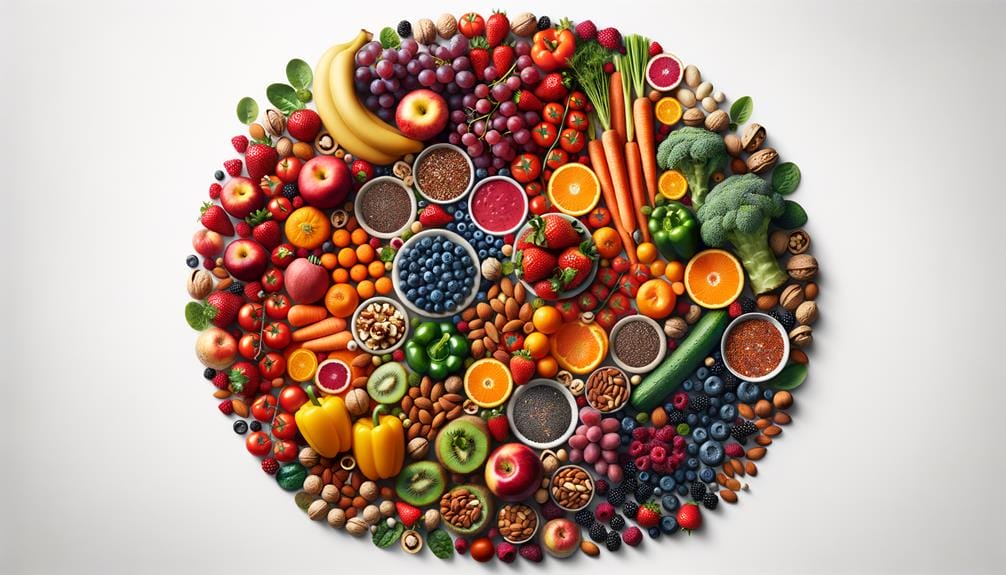








Leave a Comment